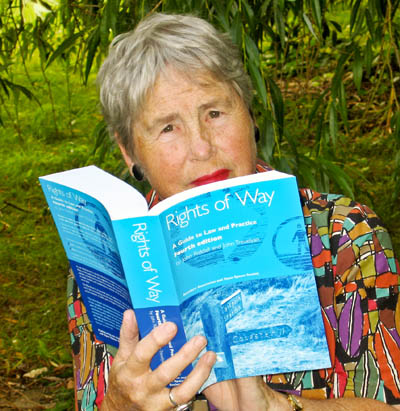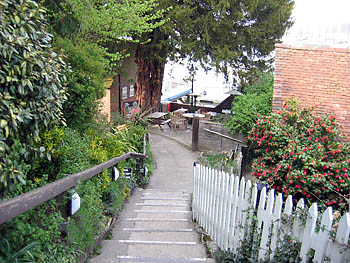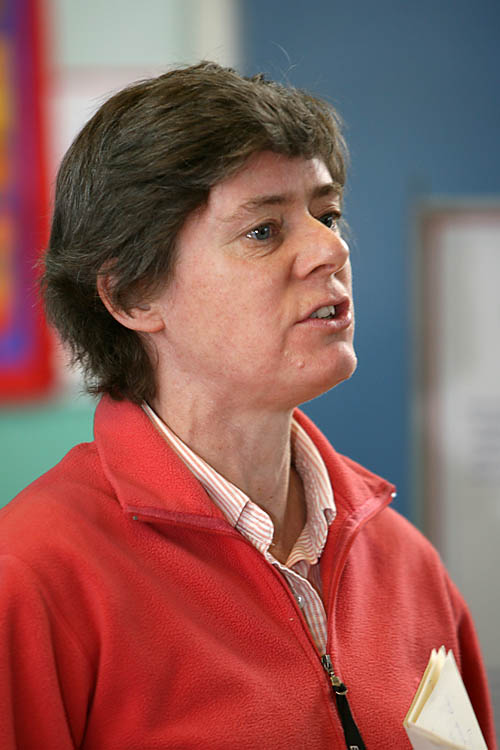
Diane Andrewes
A campaigner is celebrating her victory after she succeeded in getting two footpaths recorded in the face of opposition from a former pub landlord and inaction by a council.
Diane Andrewes had battled for ten years to get two paths near the Jolly Sailor pub in Bursledon, Hampshire, added to the official list. A planning inspector agreed with Ms Andrewes and rejected a contention by a former licensee of the pub that the routes were private.
The paths lead to the shore of the River Hamble, south-east of Southampton. Hampshire County Council refused to push for the paths to be officially recorded, so Ms Andrewes was left to bring the case herself, supported by the Open Spaces Society, of which she is a trustee.
Understandably, she welcomed the decision of inspector Heidi Cruickshank, who said that the evidence showed that the route probably originated as an access for the Jolly Sailor and to the foreshore, often in connection with boating use.
Ms Andrewes said: “This is a wonderful result, and fully justifies my ten-year campaign to have these paths added to the official map. Now people know that the paths exist in law and can be legally used and enjoyed.”
She called ten witnesses at the inquiry, including a former landlady of the pub who confirmed the public used the footpaths during her tenure. This contradicted the objection of a Mr Barham, whose family ran the pub from the 19th century to 1944 and who claimed a sign existed saying the route was private.

The Jolly Sailor path
After his family left the pub, public use of the path increased and Ms Cruickshank held that it had been used without hindrance for twenty years and should therefore be added to the definitive map.
Kate Ashbrook, general secretary of the OSS, said: “We congratulate Diane and her fellow villagers for their persistence in seeing the application through. This is an excellent outcome, which confirms what they always believed, that these routes are public paths. Now they are protected forever and can be used by all.”
The OSS is also battling on three other fronts. It is fighting a plan by Bristol Council to move a path to make way for sports pitches at South Purdown. The society’s objection is one of 11 which will be presented at a public inquiry.
Kate Ashbrook said: “The proposed sports pitches will desecrate this rare and much-loved open space, a splendid gateway to Bristol.”
Meanwhile, in Cumbria, the society has objected to plans for a swap of common land by South Lakeland Council in Kendal. The OSS has been joined in its campaign by the Friends of the Lake District.
The council wants to exchange common at New Road for 11 acres on the edge of the town.
Ms Ashbrook said: “The New Road common is currently an eyesore, being used for informal car-parking and encumbered with an unsightly toilet block. But such use should not be permitted: the common is protected by a scheme of regulation dating from 1910, with bylaws which render car-parking unlawful. And just because the land is unsightly at present is no reason to remove it from the commons register.

Kate Ashbrook
“Instead it should be tidied up and restored to the people of Kendal for informal recreation and games. In the heart of the town and next to the river, it offers wonderful opportunities for quiet enjoyment, right on people’s doorsteps.
“The district council should be ashamed that it has allowed the land to be so abused.”
In Gloucestershire, the county council has said it will review its procedures after the OSS and Ramblers’ Association challenged the closure of public footpaths for private events at Sudeley Castle, Winchcombe, on four occasions for a total of 11 days.
The two groups argued that the council was using the wrong law to make the temporary closures and that the authority should take account of walkers’ needs.
Gerry Stewart, the local representative of the OSS, said: “The closure of several public footpaths for a total of 11 days during the summer months this year caused exasperation for many of the regular visitors who enjoy strolling around the castle and adjacent parkland.
“The county council is being pressed to take full account of the public’s interests as well as those of the landowner when considering future closures. Such consideration would result in much less inconvenience and unnecessarily frustrating diversions for walkers.”